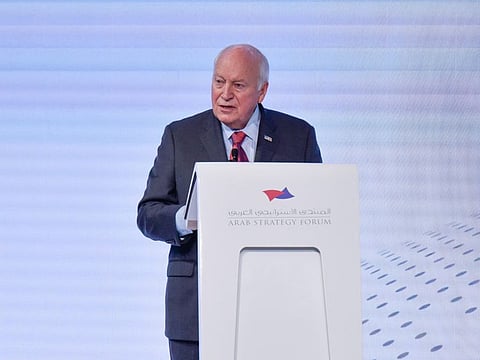Cheney: US retreat from region will help Russia, Iran
Disengagement can only carry even greater risk than action, he says

Dubai: Any departure from American policy in the Middle East will benefit Iran and Russia which is “always on standby to fill power voids”, former US Vice President Dick Cheney said on Monday.
Addressing the 12th Arab Strategy Forum, Cheney said: “There are some deeply malign forces at work in the broader Middle East, as well as disturbing influences from outside and any disengagement (on the part of the US) is just another term for leaving all the power to them.”
The forum was attended by His Highness Shaikh Mohammed bin Rashid Al Maktoum, Vice-President and Prime Minister of the UAE and Ruler of Dubai and other dignitaries.
“Russia is always on standby to fill power voids. That is how it happened that Russian troops swept in when the US left northern Syria … Nobody will remember it as our finest hour,” he said.
Calling NATO as the most-formidable alliance in history, he said, “This post-war system has been so fundamental that it has hardly mattered year to year which political parties were in power.”
Clarifying that he was not speaking either “for or to the American Government”, Cheney traced the highlights of the US policy over the past few decades. It was worth looking at “how much we’ve achieved for America and our friends and allies across the world”, with “humanity being better off” for protecting the influence of America and its allies, he said.
“Diplomatic engagement, military strength, coordination of intelligence, all these and more, have made a difference for security, freedom and progress,” he said, adding, “This history also helps answer the question why American influence is still often called upon in the Middle East. It is well understood we have friends and vital interests here, we have commitments and obligations here, and of course enemies operating here with aims that are directly contrary to American security and hopes for future peace in this region.”
He said with this “clear idea”, America had deterred or confronted threats. “This has involved tough calls along with some work and sacrifice. One always has to bear in mind the alternatives,” he said, adding that, “Inaction can only carry even greater risk than action, just as stepping away from problems or simply not seeing them for they are.”
He said it was worth thinking about Al Qaida or ISIS and what they could come up with next had they not been surveilled and tracked. “So when I look at the region, I am watchful for any departure of American policy from the very sound tradition I just described. Frankly, I am concerned and have been for some years now.”
Referring to Iran as a case in point, he said, “We all know what the mullahs in Tehran want most of all - to acquire nuclear weapons. As for the nuclear deal with Iran five years ago, it was unenforceable. It offered no concrete assurances for America or regional security. It rewarded the mullahs for 35 years of bad faith … the only time anything worked our way was when President Trump declared it null and void.”
‘China will never learn from a world super power’
Li Zhaoxing, Chairman of the Foreign Affairs Committee on the 11th NPC and former foreign minister of China, who also spoke at the session, congratulated the UAE on its completing 48 years.
“Be forever young,” he said. Lauding the country for his unique achievements, he spoke of the multi-nationality crew of Emirates, the world’s tallest building Burj Khalifa and the fact that 88 per cent of the nine million people living the UAE were foreigners.
When Cheney remarked at the panel discussion moderated by Sean Cleary that China had not met with America’s expectations and that the regime had become “more oppressive”, and “assertive” Zhaoxing said, “China will never learn from a world super power and will never try to be hegemonic.”
He also reminded Cheney of America’s freedom from its colonial past and the First Joint Communique signed by the US and China in February 1972 in Shanghai “China believes in keeping the people – from China and across the world – at the centre of everything it does. The One Belt, One Road initiative is an example of how China wants to learn from others’ experiences and cooperate for peaceful coexistence. History is the best teacher, but the US has forgotten its own history. You don’t keep your promise,” he said.
Zhaoxing dismissed the trade wars of today to take the audience back to a time when the US was fighting similar trade wars with the British. “The North American continent used to be a colony of the British empire. The Americans were ruled, exploited and bullied, and they greatly suffered. And now you want to bully others, just like the British used to,” he added.


